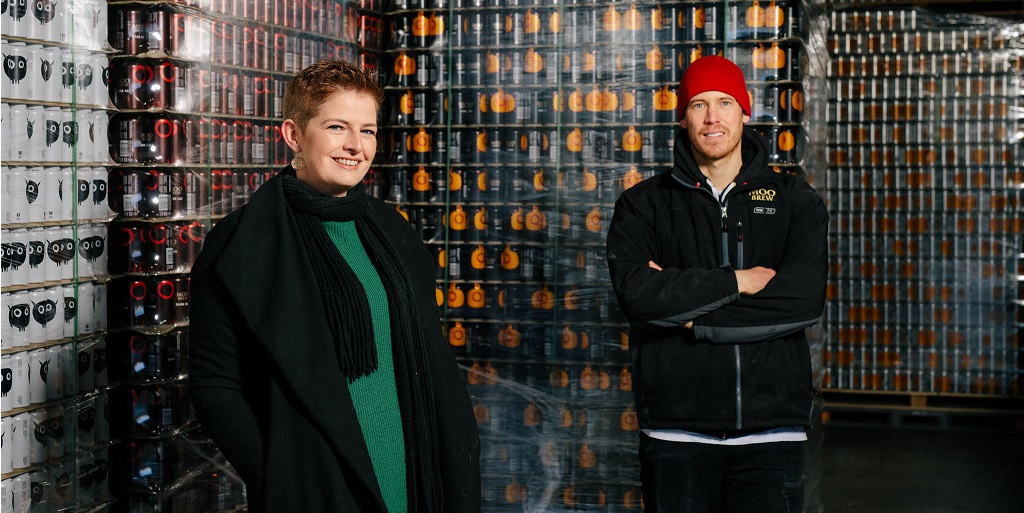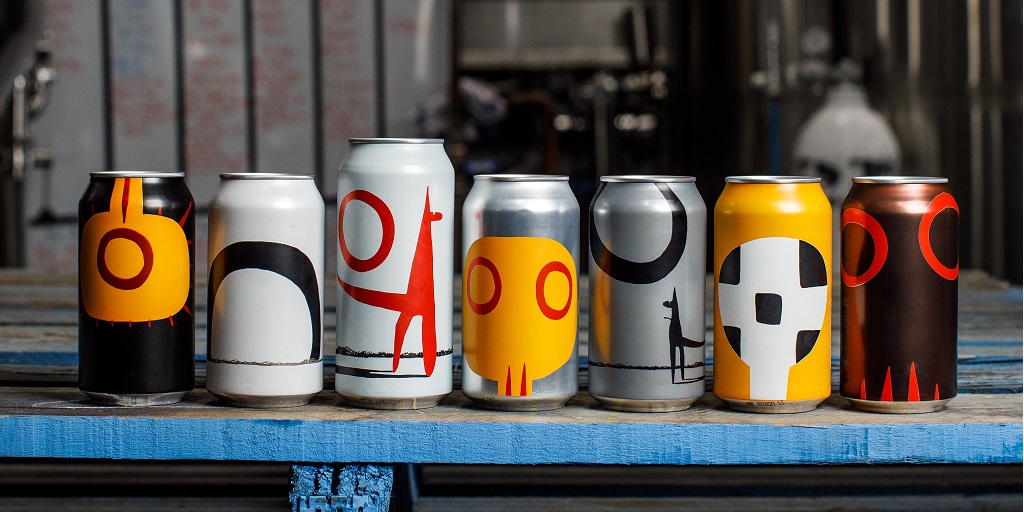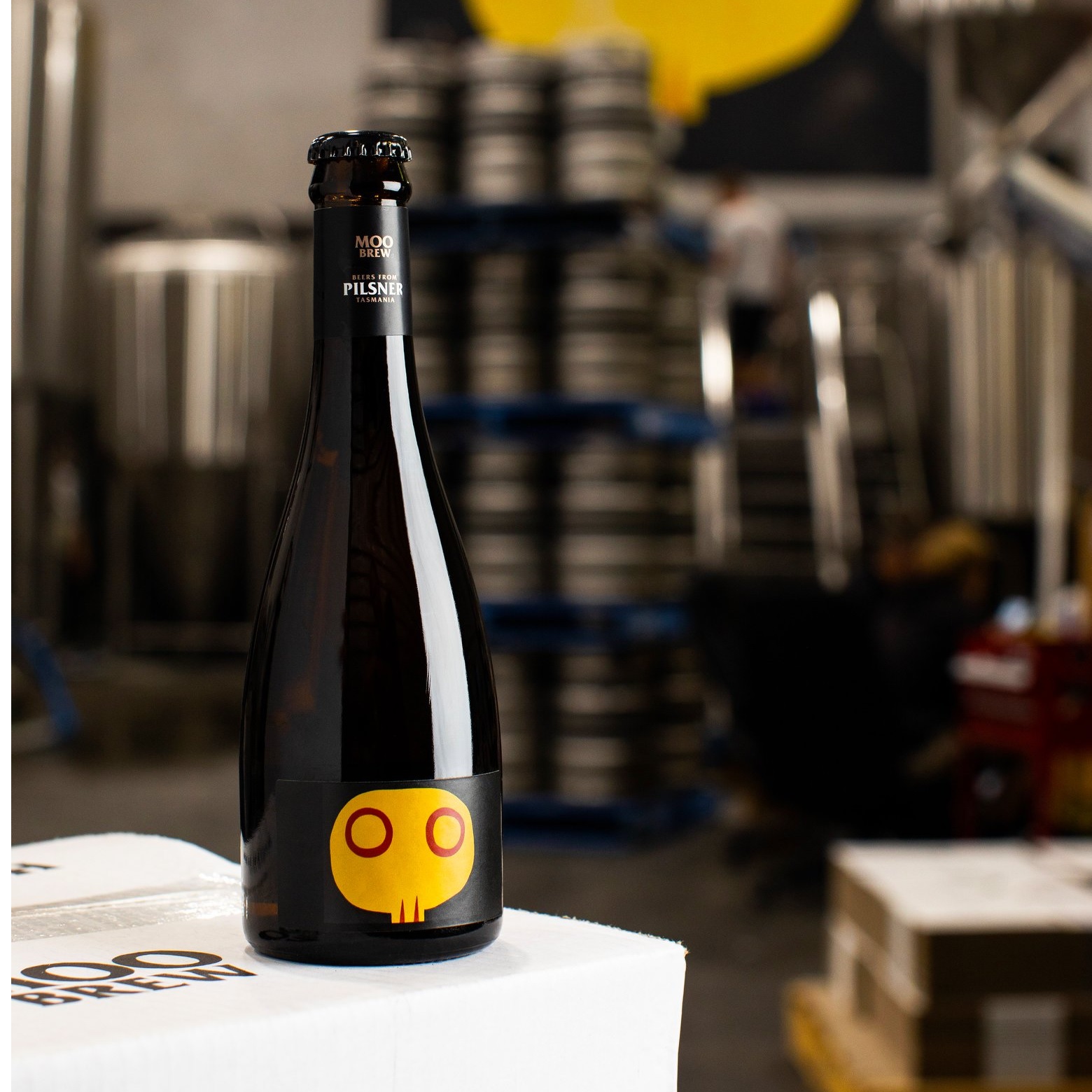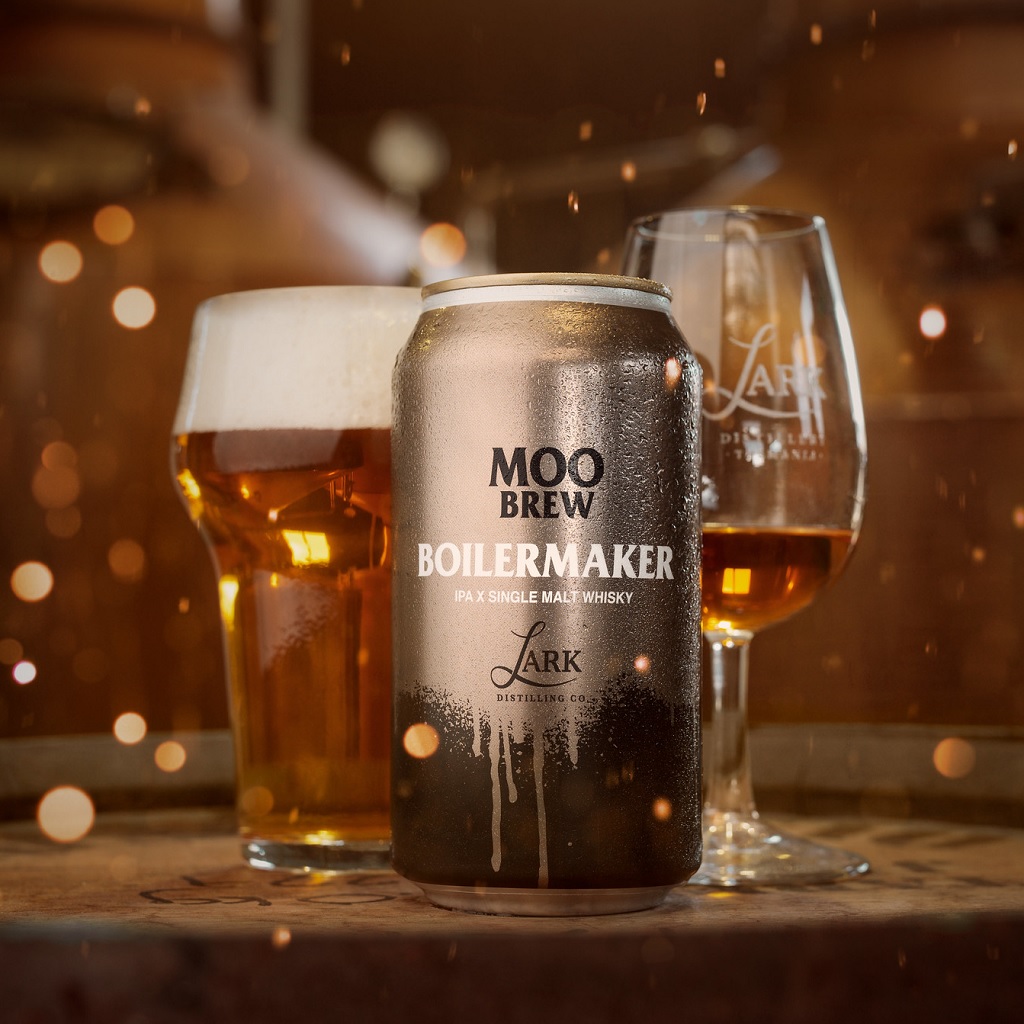
Moo Brew: Still learning at 15

GM Lauren Sheppard with head brewer Jack Viney
Tasmania’s Moo Brew is celebrating 15 years in business this month.
The milestone comes after a testing year as the brewery faced the challenges associated with COVID, as well as internal changes which saw the departure of head brewer and general manager Dave Macgill earlier this year after 14 years.
Lauren Sheppard was appointed to fill the GM role, having worked at Moo Brew-founder David Walsh’s winery business Moorilla Estates since it acquired her business, Domaine A winery.
“It was a real cultural change in that I went from a European family wine business to Mona, but it was incredible and I was really fortunate,” Sheppard told Brews News.
“David [Walsh] likes to joke I’m a bit too commercial in my background for what Mona is known for.
“But especially during COVID where there’s been that element of change – you’re never really sure the world is going to be as you know it today – so that commercial focus, without it being the main driver, is something we need to be aware of.”
While the change from winery to brewery was a culture shock initially, it did not take long to see the similarities between the two businesses.
“I was a bit nervous about it initially,” admitted Sheppard. “But at the heart of it lies the same intent – knowing what the consumer is looking for – and there is certainly a massive element of creativity.”
Sheppard brings a fresh perspective to the business which has had a long and colourful history. Making it to 15 years in the brewing industry for any business is certainly admirable, and, as any good brewery should, Moo Brew has an origin story.
Founder David Walsh, an eccentric Tasmanian gambling magnate, found a bottle on his travels that he liked so much he wanted to fill it with something, eventually deciding to build a brewery.
Moo Brew was launched, even before the Museum of Old and New Art for which Walsh is probably most famous, on the site of the Moorilla Estate winery which he acquired in the 1990s.
“For a craft brewery that started in a tiny little vessel at a winery, ultimately longevity in itself is the thing we’re most proud of,” explained Sheppard.
“The fact we’ve been able to stick around and have continual production in an industry that some would argue is tough is a big achievement.
“When people talk about Moo Brew they talk about our independence, our Tasmanian roots, and from a production point of view, we’re also really proud of our reputation for consistency and quality.
“The challenge in getting there. It’s not an achievement if you didn’t have to work hard to get there.”
COVID
As with many breweries, the COVID-19 crisis has taught Moo Brew something about the business, its consumers and its strategy.
“Because of COVID [we’ve noticed] real loyalty purchasing and that place and pride of place have become even more important than they have ever been,” Sheppard said.
“Luckily for us, people are tending to buy for quality rather than quantity.”
COVID-19 has not been without its challenges. However, a change in 2017 which saw the brewery move from its distinctive bottles to cans proved to be a godsend.
“Thank heavens for cans, especially in COVID,” said Sheppard.
“We were so aware of what everyone in the industry was dealing with, especially the smaller guys who are reliant on the taproom or the direct-to-consumer model.
“Sometimes I can’t believe we don’t have a taproom or a model like that, but we were lucky to have really well-established wholesale and distribution channels in place and it has seen us through well. We haven’t had to lose production staff, sales are tracking really well and we haven’t seen any downturn, except in volume in terms of kegs.
“Cans are our quiet achiever, and although the bottles may never completely disappear, I’m grateful that Dave and my predecessor made that decision.”
Moo Brew is fortunate to have its own canning line, something which smaller brewers may not necessarily be able to afford, especially in Tasmania where shipping and freight only adds to the costs.Interestingly, the team made the decision to bring distribution in house effective from July 2020, which was a gamble that seems to have paid off.
“Our economies of scale have helped us, and I firmly believe it was the right choice for us and our sales figures have seen no negative impact for making that decision, and that extra margin has been a nice buffer in COVID too.”
Tasmania
Tasmania’s tight-knit brewing community has proven hugely successful. Its collegiate approach even saw a team including Moo Brew, Shambles Brewery, Spotty Dog and Hobart Brewing Co. scoop the sponsorship for the Taste of Tasmania from a major brewer last year.
“An advantage we have had, compared to other states and territories, is our smaller size,” Sheppard suggested.
“We don’t deal quite so much with the flood of breweries and microbreweries, we’ve got a group of about 20 here so we haven’t had to elbow each other out of the way in quite the same way, or struggle for a slice of what was available.
“We’ve got a good balance of breweries that have different models, scales, customer bases and so I’m hoping I’m right is saying that we have survived it as well as we could have.”
In fact, she said, COVID may have brought the industry even closer together.
“There’s a sense in beer and industry generally in Tasmania of how reliant we have been on the tourism market and visitation to Tasmania domestically.
“It became evident with a really strong premier and borders that it was going to be a longer wait time than other states until we return to normal.
“With that, there came a renewed sense of community, and of the importance of banding together to save costs where you can, find new ways into markets, and make products that compliment each other if we can too.”
The beers
Having come from a background in wine, Sheppard explained that working with brewers was not too far removed from working with winemakers.
“They are very technically proud, and that’s fair to say of our new head brewer Jack [Viney] too,” she said.
“They’re scientists at heart which you find if you can learn to work with them and respect their craft. I see my role as finding ways and efficiencies to ensure that the people who are the heart and soul of the business, the winemaker or brewer, get every element they need to continue to elevate their craft.”
Indeed, Moo Brew beers have been award-winning, just this year its Moo Brew Pilsner was named the Brewer’s Choice Best Champion Lager since 2012.
Famously, Moo Brew said it would never brew an IPA, because founder David Walsh was not a fan of the style. After some arm-twisting, the Moo Brew IPA was added to the core range and subsequently won a number of awards, including a gold medal at the 2019 AIBAs.
“The IPA story is probably one of my favourite ones,” said Sheppard. “It’s so Mona.
“None of the Daves, both David Walsh or our former head brewer Dave MacGill, are hamstrung by what someone thinks they should do.
“The Moo Brew origin story is not the normal way to start a brewery, and if it was normal it wouldn’t be Mona. It was the same with the IPA.
“David [Walsh] puts a lot of faith in us as the custodians of the business, and it’s refreshing to work with someone that supports you and says ‘go with your gut’.”
In this vein, the future of Moo Brew is to ensure its quality and consistency remains but also try new things, according to Sheppard.
“My plan is to make the most of the strong base left by my predecessors,” she said.
“The core range is strong and we’re really proud of those beers, and we’ll keep doing what we do, but we will play a bit more in that agility space. We have an incredible crew of brewers with a huge amount of experience behind them and I’m hoping to be able to give them the financial and process freedom to flex their ‘limited edition’ muscles.
“Each limited teaches them something else about their brewhouse and brings another skill to enhancing our core range, so there’s no shame in doing both.
“Our Lonely Beers Club showed our customers that there are a few more tricks in the show bag if you like, and we plan one every couple of months and that can be pretty daunting on top of our core volumes – and I couldn’t cope with the stress of doing one a week!”
But Sheppard is still keen to stay true to Moo Brew’s roots.
“We’ve got a beautiful legacy of head brewers that are passionate about what they do which has only repeated itself with Jack,” she said.
“Each one brings a bit of evolution to the business and I want people to feel assured that the legacy will continue.”






